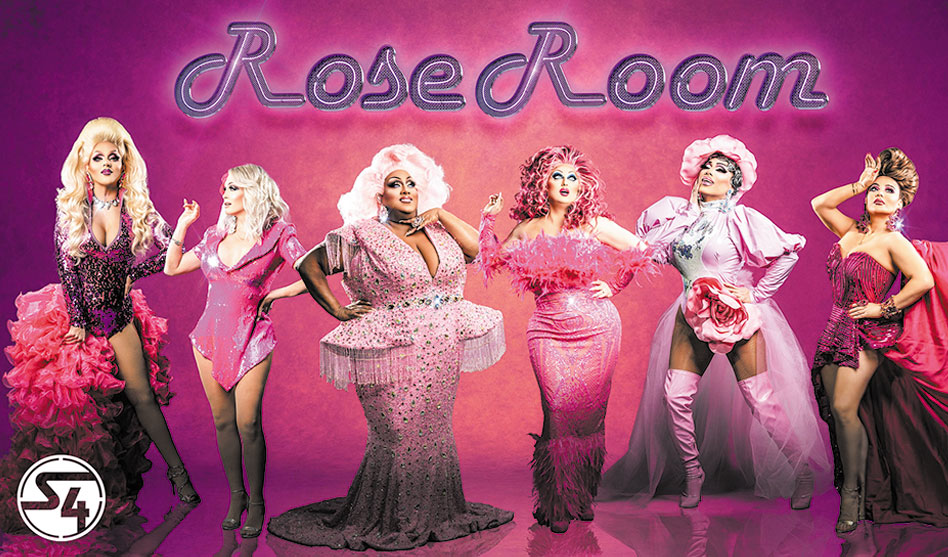Cassie Nova (aka James Love) is the show director for the legendary Rose Room inside S4. Other cast members include, from left, Jenna Skyy, Krystal Summers, Kelexis Davenport, Layla LaRue and Sasha Andrews. (Photo by Manny Vega, courtesy of The Rose Room)
The real ramifications of Senate Bill 12
CAROLINE SAVOIE | Contributing Writer
carosavoiswriting@gmail.com
As Texas lawmakers scrambled during the 2023 legislative session to criminalize “the radical left’s disgusting drag performances” in the name of children’s safety, the state’s rich history of queer performances watched, unappreciated, from a dusty corner of the State Capitol.
Lt. Gov. Dan Patrick’s vitriol toward family-friendly drag performances continued as he celebrated the passage of Senate Bill 12 after its passage on May 28. “It is shocking to me that any parent would allow their young child to be sexualized by drag shows,” Patrick said in a press release. “Children, who cannot make decisions on their own, must be protected from this scourge facing our state.”
James Love, aka Cassie Nova, is a Dallas drag veteran with more than 30 years experience who’s done drag queen story hours at the Dallas Public Library and Dallas Museum of Art. Love went to the state capitol in Austin in April to speak against SB12.
“It’s a direct attack on me and my community,” Love said. “From Mrs. Doubtfire to M*A*S*H, drag has been around forever. Now all of a sudden, drag is after your children? It doesn’t make sense.”
The “scourge” Patrick referenced is more than 100 years old, with deep roots in Dallas. At the State Fair of Texas in 1890, “female impersonators” took the stage for an all-ages audience. The Dallas Morning News said that day at the fair was set aside for children, where schools brought their students, and teachers got in for free.
The state’s drag scene has grown from exclusive to diverse and ballooned onto the world’s stage in the last 133 years, with several Dallas queens appearing on national drag competition shows. But the nationally-recognized community is now facing attacks from Texas lawmakers and residents unlike ever before.
Equality Texas spokesperson Johnathan Gooch said many of the battles were fought at the Capitol, with more than 140 anti-LGBTQ bills coming up for vote during the 2023 Texas Legislature. And while Equality Texas tried to kill SB 12 in session, the much-debated and often-edited piece of legislation passed, was signed by Gov. Greg Abbott and will go into effect on Sept. 1, just days before Pride in Dallas’ week-long celebration begins — not to mention other Pride events planned around DFW and the state.
That’s unless a federal judge in Texas rules otherwise.
Legal challenges
On Aug. 2, a group of drag performers and human rights advocates filed a federal lawsuit to block the new law. They argue that the language is meant to target drag shows, and, due to the scope of behavior that falls under the law, could inadvertently criminalize some dance performances, including cheerleading.
The American Civil Liberties Union, who filed the suit in Houston on behalf of the plaintiffs, said the law criminalizes constitutionally-protected conduct and threatens the “livelihood and free expression of many Texans, including drag performers across our state.”
The Texas Civil Rights Project filed a similar challenge to SB 12 that same week, with the North Texas LGBT Chamber of Commerce and several local drag performers as plaintiffs.
Judges have already blocked similar laws in Florida and Tennessee, where drag bans are now on hold.
In removing the term “drag” from the bill during debates, the legislature broadened the scope of what could be considered illegal. It bans real or simulated groping, real or simulated arousal and the display of a sex toy if done in a “prurient” manner in front of a minor or on public property. It also prohibits Texas performers from wearing accessories or prosthetics that “enhance” the female or male form in front of a minor or on public property.
“This is a very fluid bill,” said Jenni P, who’s been doing drag for more than 30 years. “It’s easily maneuvered for them to hurt us anyway they want.”
The ACLU’s lawsuit said some TV shows, movies and internet activity could also fall under the guidelines, and “any type of wardrobe malfunction” could result in fines or jail.
“The Texas Drag Ban is stunningly broad in scope and will chill entire genres of free expression in our state,” said Brian Klosterboer, attorney at the ACLU of Texas. “This law flies in the face of the First Amendment. No performer should ever be thrown in jail because the government disfavors their speech.”
Opposition to the ban
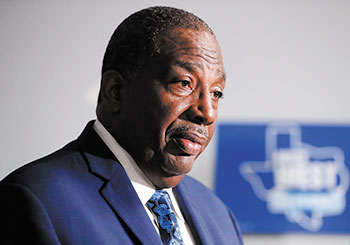
Sen. Royce West
Sen. Royce West, a Dallas Democrat who voted for the bill’s original language that mentioned drag outright, walked back his support once he met with Dallas drag performers and trans residents. He said he believed the bill was meant to ban any sexual performance in front of children, and he didn’t realize how the entire LGBTQ community could be implicated.
Now, he’s vehemently against the bill.
“To the extent that we feel a law is unconstitutional, we have to challenge it, West said. “We have to challenge it at the local level, at the state level, at the federal level; take it all the way to the Supreme Court.”
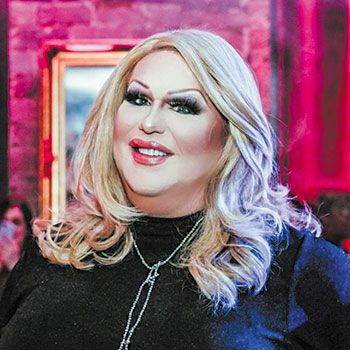
Jenni P
Business owners, performers and legal experts range in their opinions about the law’s looming impact. Jenni P said that while children aren’t the target audience of most drag performances, children can enjoy the shows as well. Moreover, Jenni said, performers tailor their style to fit the audience.
Drag, like other forms of entertainment, exists on a spectrum from risque to G-rated. Story hours and nightclub shows, Love stressed, could not be more different: While both are comedic, they are targeted at different audiences. Cassie can crack a few PG jokes to keep the parents entertained at a story hour, but she covers up the cleavage and trades showgirl garb for princess dresses, he explained.
“I think we can all agree that we don’t want sexual performances in front of children,” Love said. “But there’s nothing sexual about just being in drag. When my audience is children and their parents, you’re gonna get a different show than you get in the Rose Room.”
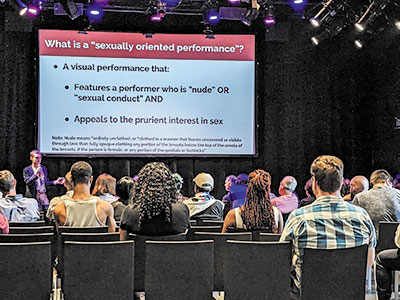
TCRP and the North Texas LGBT Chamber hosted an information session on SB 12 this week.TCRP has filed a legal challenge to the drag ban on behalf of the chamber and other plaintiffs. (Photo by Lisa Howe, courtesy of North Texas LGBT Chamber)
Jenni P said a young boy and his mother attended one of her all-ages shows because the child was obsessed with drag and makeup and wanted to be a makeup artist. Jenni brought him onstage and introduced him to the crowd. Mother and son spoke with Jenni after the show, and the queen mailed the son a makeup kit to get him started.
“We’ve all seen a child in the audience, and we’ve all adjusted our performances and verbiage accordingly,” Jenni said. “Now I don’t feel comfortable with children in the audience, because I don’t want to get accused of something.”
Jenni said for most of her career, she’s exclusively performed at 18+ shows. She has been performing in Texas for 20 years, but in the last couple of years, she said, she’s been harassed and threatened for her devotion to drag more than ever.
“I’ve never been called so many names in my life on social media,” Jenni said. “I’ve been threatened on social media and called a pedophile, a groomer. It’s on a daily basis at this point.”
The history of drag in Texas
Texas queens fear that lawmakers are trying to erase a history that they’re not a part of and that they don’t know about. It’s a history that runs deep and colorful through the heart of Texas.
Drag thrived in the 1920s and ’30s during Prohibition, with more straight people being drawn to underground clubs where queer artists performed. In the ’30s, police raided a club in San Antonio and arrested seven performers. But officers couldn’t find a crime to charge them with, so the performers were released.
The first gay club in Dallas opened in the 1950s, and despite its illegality, drag continued to draw crowds at late-night theater shows and supper clubs through the ’60s.
In 1972, the first record of two men getting a marriage license in Texas was between a female impersonator and his partner in Houston. When local officials realized both parties in the couple were male, the marriage was ruled invalid.
In the 1970s and ’80s, Texas’ drag stages featured performers like legendary icons Tasha Kohl and Hot Chocolate, both of whom continue to perform today, with Tasha Kohl based here in DFW and Hot Chocolate, aka Larry Edwards, based in Las Vegas.
In the ’80s, with the onset of the AIDS crisis, drag’s focus shifted from entertainment to charity. Awestruck fans handed queens $1 and $5 bills to raise money for the cause, a tradition that prevails, at least in symbol, today.
And in the ’90s, drag kings and Black performers entered the spotlight. In 1996, the first Miss Gay USofA pageant made Dallas its home, working in tandem with the Rose Room to solidify Dallas as one of the capitals of drag.
Robert Emery, who is among the founders of the extensive LGBTQ history archive The Dallas Way, said Dallas has always been the “epicenter of drag in the South.”
“We love what we do, and we love doing it here,” Jenni P agreed. “Our goal is to entertain, and I’ve been able to do that for 30 years. Now this whole ‘grooming’ thing has changed everything. It was like overnight, all of a sudden, we were being targeted.
“Every week, something new popped up that we were being blamed for.”
Fighting the ban in Austin
Mike Hendrix, an Austin-based lobbyist, played an integral role in getting legislators to remove the
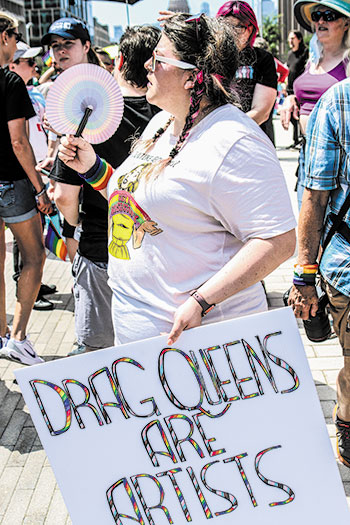
Drag supporters marched on the Texas Capitol in April to oppose SB 12 and other anti-LGBTQ legislation.
(Tammye Nash/DallasVoice)
word “drag” from SB12 in April. Hendrix often works with Texas Republicans on behalf of progressive constituents to undercut aggressively anti-LGBTQ+ legislation.
When Mike Nguyen, CEO of Caven Enterprises, noticed his efforts to get Dallas city officials involved in stopping SB12 were fruitless, he decided to hire Hendrix to represent LGBTQ interests in Austin. Caven — which owns TMC, S4 and The Rose Room, JR.’s Bar & Grill and Sue Ellen’s — and HV Entertainment — which owns the new Hamburger Mary’s in Dallas — are two of the biggest drag companies in Texas. They spent more than $250,000 fighting SB 12.
“I know how they think, and I know how to deliver a message to them, Hendrix said of his work in Austin with conservative lawmakers. “I talk to them about the ‘spirit of the bill,’ to see their point of view. The outcome is never what I want, but it’s always better than what they were going to pass.”
Hendrix explained that progressive Texans are fighting a losing battle if their goal is to strike down any legislation targeting LGBTQ residents during session. “People need to understand that Republicans have the votes to pass any of this anti-LGBTQ legislation they want,” he said. “The bills are either going to be really bad or are they are going to be watered down. But they’re going to pass.
“My job is to compromise, to take the teeth out of dangerous legislation.”
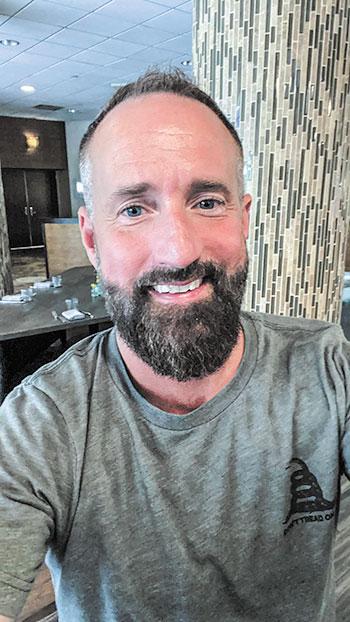
Mike Hendrix
Hendrix said groups who protest to kill the bill completely, like Equality Texas, give all their negotiating power away. “Why fight a losing battle when you can negotiate a better outcome?” he asked.
But Gooch, Equality Texas’ spokesperson, said the group felt compelled to try and kill the bill because any form of it that passed would explicitly target the LGBTQ community. “No matter what version of the bill comes out, the spirit of the bill will be reflected in the impact, in this chilling effect that’s going to occur,” Gooch said.
He said that most drag shows don’t “appeal to the prurient interest of sex,” but because most people don’t dig into the bill, they’re going to tamper down their behavior because they’re worried about getting in trouble.
And, Gooch added, that’s what lawmakers were hoping for.
“Drag inherently challenges gender expectations, and that can be threatening to people who have a more narrow approach to gender,” he explained.
What about Pride?
Hendrix said where Pride in Dallas is concerned, as long as the people at the festivities aren’t showing real or fake genitalia, there should not be a problem: “As long as you’re not intentionally exposing yourself or fake body parts to a child, this law should not harm you,” he said. “This bill does not ban story time or drag Sundays.”
Tracy Nanthavongsa, spokesperson for Pride in Dallas, said the new law slowed down the planning process for this year’s events, as they were worried the bill would ban drag outright. He said while that is a common misconception about SB12, the bill doesn’t criminalize all drag performances in front of children. “Sexual conduct” in front of minors has always been illegal under Texas law.
James Ware, head of Pride in Dallas, said his organization has a morality clause addressing attire and behavior for anyone in the parade to keep the event age appropriate.
“That’s the absurdity of this whole thing,” Ware said. “There’s this narrative on the right, where they rely on fear-mongering and say the gays are trying to sexualize your children when in fact, we work to make sure they’re safe.”
Ware said children who live in Oak Lawn grow up going to Pride parades, and it’s as much a part of their culture as anyone else’s. Despite the all-ages nature of the parade, Nanthavongsa said he isn’t worried that police will over-enforce the new law if it goes into effect. He said the Dallas Police Department’s LGBTQ liaison and the Dallas County Sheriff’s Office are both going to be in the parade, and they’re working together to make sure everyone is safe and no one is wrongfully arrested.
Hendrix said his legal team at Texas Arts and Commerce Group will also be on standby to help anyone who is prosecuted or hurt as a result of this bill. He said he developed a hotline — available at DefendAgainstSB12.com and by phone call or text at 469-998-8912 — where people affected by SB12 can call to talk to attorneys.
“We will put the full force of our legal and lobby team together to fight this in the courts,” he added.
West said he knows other states will follow Texas’ lead in targeting trans people and drag performers. He warned that a Republican win in 2024 will undoubtedly bring a swath of anti-minority legislation even broader than last session’s.
But Nguyen insisted that in spite of endless efforts to dull its sparkle, drag in Dallas will prevail.
“Customers come from all walks of life to visit The Strip,” he said. “I hope it continues to grow, so more people can experience the magic. Our queens are a major part of that. They’re part of us.”



